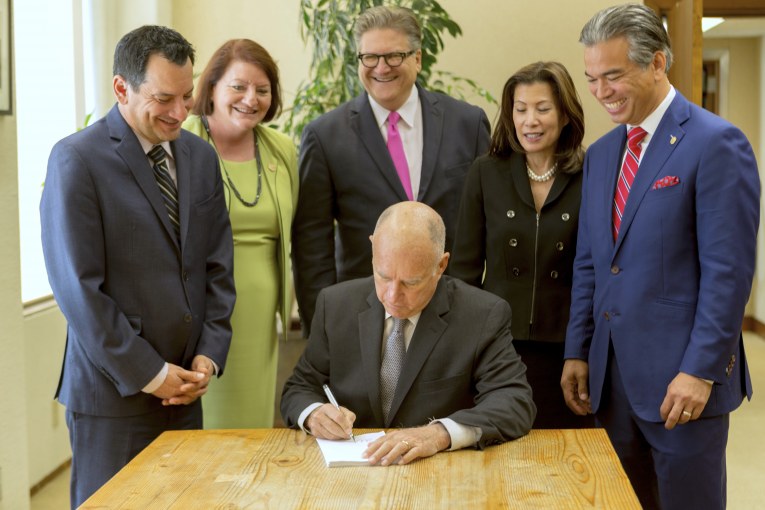

Governor Jerry Brown signed SB 10 into law on Tuesday – meaning that next October 2019 cash bail will end in California. The law will establish a new system for determining a defendant’s custody status while awaiting trial, based on an assessment of risk to public safety and probability of missing a court date rather than on ability to pay cash bail.
“Today, California reforms its bail system so that rich and poor alike are treated fairly,” said Governor Brown.
This action delivers on the commitment made last August by Governor Brown, California Chief Justice Tani Cantil-Sakauye and the bill’s authors – Senator Robert Hertzberg (D-Los Angeles) and Assemblymember Rob Bonta (D-Alameda) – to work together on long-needed reforms in the second year of the two-year legislative session.
“Our path to a more just criminal justice system is not complete, but today it made a transformational shift away from valuing private wealth and toward protecting public safety. Thanks to the collaboration of the Governor, Chief Justice, and the Legislature, we are creating a system that is fairer for all Californians. Today’s signing is historic, and California will continue to lead the way toward a safer and more equitable system,” said Senator Hertzberg for the bill’s sponsors.
But the view was not universally positive. In order to get the measure through the legislature, it took compromise – compromise that caused the ACLU, among others, to oppose the legislature.
The ACLU leaders, Abdi Soltani (Northern California), Hector Villagra (Southern California), and Norma Chávez Peterson (San Diego & Imperial Counties), issued a statement saying, “We are disappointed to see Senate Bill 10 signed into law. SB 10 is not the model for pretrial justice and racial equity that California should strive for.
“It cannot guarantee a substantial reduction in the number of Californians detained while awaiting trial, nor does it sufficiently address racial bias in pretrial decision making. Indeed, key provisions of the new law create significant new risks and problems.”
They added, “We call on lawmakers to be vigilant to ensure racial justice and fairness in our pretrial system. A first step is following through on Senator Hertzberg’s commitment to address racial bias in risk assessment tools with new legislation. The implementation of this bill – and subsequent legislation in this area – must ensure a significant reduction in incarceration and also provide due process and promote racial justice. We will work with lawmakers and our community partners to achieve that goal.”
bias in risk assessment tools with new legislation. The implementation of this bill – and subsequent legislation in this area – must ensure a significant reduction in incarceration and also provide due process and promote racial justice. We will work with lawmakers and our community partners to achieve that goal.”
Advocates, however, point out that this is the first step toward improving the system.
The current bail system, they argue, punishes low-income individuals by presenting a terrible choice: stay locked up for months (before ever being convicted) and risk losing your job and your livelihood; go into debt to pay a bail agent a nonrefundable deposit to post your bail; or plead guilty to be able to go home.
In the meantime, the wealthy can buy their freedom.
While some individuals are considered a risk to public safety and may be held in custody for that reason, many are not a threat to public safety and could be released, monitored and reminded when to return for court hearings.
Under the new law, defendants will be held only if they pose a significant risk to public safety or risk missing their court date. Recommendations for non-monetary release conditions, such as GPS trackers, electronic home detention, or a number of other proven methods, would instead be made in place of money bail.
“Today, California takes a transformational step forward to correct a fundamental injustice. Abolishing money bail and replacing it with a risk-based system will enhance justice and safety. For too long, our system has allowed the wealthy to purchase their freedom regardless of their risk, while the poor who pose no danger languish in jail. No more. Freedom and liberty should never be pay to play,” said Assemblymember Bonta.
The bill was heavily based on the recommendations of the Chief Justice’s Pretrial Detention Reform Work Group, which determined that California’s current system, “unnecessarily compromises victim and public safety because it bases a person’s liberty on financial resources rather than the likelihood of future criminal behavior.”
“This is a transformative day for our justice system,” said Chief Justice Tani Cantil-Sakauye. “Our old system of money bail was outdated, unsafe, and unfair. It took a three-branch solution with Governor Brown, the Legislature led by Senator Hertzberg and Assemblymember Bonta, and the Judicial Council’s Administrative Director Martin Hoshino working with judges in my Pretrial Detention Reform Work Group to bring about a fair and just solution for all Californians.”
“A person’s checking account balance should never determine how they are treated under the law. Cash bail criminalizes poverty and, with Governor Brown’s signature today, California has opened the door to pursue and perfect a just pre-trial system.” said Lt. Governor Gavin Newsom.
“Wealth is not the measure of any woman or man. By eliminating cash bail, we are saying that those with the least ability to pay should not be released or incarcerated solely on the basis of their wealth or poverty. SB 10 is only one leg of the long journey toward perfecting our justice system, but it is an important one,” said Assembly Speaker Anthony Rendon.
“Money bail has promoted a system of separate and unequal justice. SB 10 puts all Californians on equal footing before the law and makes public safety the only consideration in pre-trial detention. This critical reform is long overdue. I’m grateful to the author and the broad coalition of advocates who worked tirelessly to make it happen,” said Senate President pro Tempore Toni Atkins.
—David M. Greenwald reporting
Get Tickets To Vanguard’s Immigration Rights Event

Long overdue–200 years. The policy standards set by the state judiciary body are perfectly fine, and subject to clean-up legislation should it be necessary. It won’t.
Processing custodies has been streamlined. This seemed to be lost in the avalance of rhetoric and posturing of one advocacy group, but oftentimes persons eligible for release even under old system were needlessly delayed due to a backload of prisoners in a holding area.
Potential for corruption favoring a particular bail bond service is minimized. Some of those seedy bail-bond offices populating areas around large county jails will close due to lack of business and become trendy boutiques and 24-hour gourmet coffee shops. Urban Redevelopment and increased tax base.
Next step, give arresting officers discretion to cite and release in the field on any misdemeanor and select level of felonies. Police render judgment every day on personal liberty releases, ten times more than judges, and do it exceptionally well. Want proof? You never hear about them.
Look hard at what we’ve done out of more than a century of routine and see how silly and costly it is. Take a guy into custody, away from his car or home, transport him as much as 50 miles or more (rural counties), book him (which could be done remotely using Skype or similar), then toss the guy out the front door with a court date and he has to find a way to get home.
If we had no custody system, and somebody proposed what we’ve been doing mindlessly all this time, that proponent would be summarily tossed in a jail cell or psychiatric ward and never seen again. Yet, that’s the process in all tens of thousands of custodial settings today, and nobody says a thing.
This could be real reform of the criminal justice system–at the temporary custodial level. Jail construction and expansion would cease, such buildings would have high vacancy rates and could be sub-divided and former cells would be converted to public housing units for the homeless using the uncalculable millions in savings of public dollars.
ACLU is crying . This bill is not good business for ACLU’s lawyers .
I don’t see how this impacts the ACLU at all. They don’t do criminal defense. This simply a difference of opinion.
If so . than could you please explain why ACLU is crying about by bringing into their opposition to the Bill racial discrimination. pretrial justice etc . Maybe ACLU lawyers are not directly involved as defense lawyers in the criminal cases but as we know both the criminal prosecution triggers civil lawsuits . I have such one civil lawsuit on my agenda which is a fruit of the criminal prosecution.
They are more likely to have lawsuits now than if they had their preferred plan. But as I understand it, they generally do not net revenue from lawsuits. Most of their revenue comes from contributions and membership. Also keep in mind, that they have set up a separate lobbying group based in Sacramento from their litigation group. I think they have concerns about the legislation. I do too. The difference is I think it’s better to get the first ball rolling and try to improve or fix later rather than killing this effort and trying to start fresh.
David
ACLU lawyers making tons of money from the civil lawsuit as same as Attorney General deputies . Primary for ACLU is bussines , secondary is discrimination and the First Amendment . Non profit for profit . We have many non profit for profit in the United States of America .
ACLU lawyers are salaried. Most of their suits have no money.